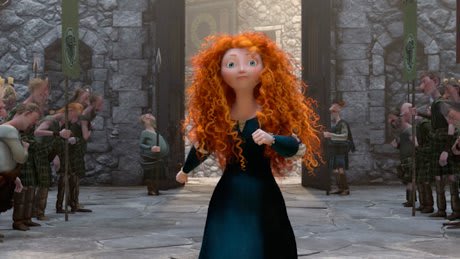There are few global brands with as much inherent goodwill amongst fans as Pixar. (Odd that Pixar's early years were partly fostered by Steve Jobs, founder of the other global goodwill brand, Apple.) Pixar films have always showcased great storytelling and have given voice to unusual protagonists who aspired to greatness beyond their station in life: Remy, the rat who wanted to be a chef; Wall-E, a garbage robot who wanted to know love; toys that find and build a community; and monsters who suffer an identity crisis. (Please note: many of these arguments are negated by the existence of Cars; that film will be ignored for the purposes of not wanting to think about Cars.) Pixar films are smart and clever and surprising and delightful. They've never condescended to the perceived audience for animation (children) and have been embraced and celebrated for it by film lovers everywhere.
What they haven't done until now is feature a girl or woman as a main character, which brings us to Brave. So this company, which has been so bold in its non-commercial choices (the silent first half-hour of Wall-E; the old man protagonist of Up; a rat chef), when making their first film starring, and centered upon, a girl has offered up... a princess movie. (Pause for the implied sigh.)
Scottish Princess Merida wants to run and play and shoot arrows, which she does better than all the boys in her patch of medieval Scotland. She gets scolded for it because being better at sports will not help her land a man, and that's the most important thing for princesses and female protagonists who are going to soon run away to escape such expectations. (Merida is voiced by Kelly Macdonald, one of the "name all the Scottish actors you can, I bet they're all in this movie" actors, along with Billy Connolly and Robbie Coltrane; Ewan McGregor was apparently busy.)
So Merida runs away to escape the three suitors who will engage in manly sports in order to win her hand in marriage. She encounters a witch and impulsively asks for a wish that goes horribly wrong and she has to use her Scottish princess moxie to get out of this horrible jam and, with any luck, learn some important lessons about family, tradition and maybe see some worth in one of her suitors after all.
Is more plot conversation than that necessary? Unfortunately, no - and that's the biggest disappointment, beyond the whole "princess" angle in the first place. This is the first "Disney" film that Pixar has made, despite having merged with that parent company several years ago; it entirely fits the "princess" brand of appropriately aspirational role models for young girls.
It's not an incompetent movie; it's not a badly told tale and the animation (particularly of Merida's wild mane of curly red hair) is, at times, spectacular. I admire the commitment to the film's very Scottish universe. (While Canadians are well versed in the various accents of the United Kingdom, this may not play well to Americans, who struggled to decipher Trainspotting.) But I'm disappointed because I had faith that the brains behind Pixar were smarter than this - that based on the unconventional storytelling they'd so successfully pulled off for more than a decade, that their first foray into a world with a female protagonist could be equally wild and inventive and unusual. Not a fucking princess movie.
(Pixar/Disney)What they haven't done until now is feature a girl or woman as a main character, which brings us to Brave. So this company, which has been so bold in its non-commercial choices (the silent first half-hour of Wall-E; the old man protagonist of Up; a rat chef), when making their first film starring, and centered upon, a girl has offered up... a princess movie. (Pause for the implied sigh.)
Scottish Princess Merida wants to run and play and shoot arrows, which she does better than all the boys in her patch of medieval Scotland. She gets scolded for it because being better at sports will not help her land a man, and that's the most important thing for princesses and female protagonists who are going to soon run away to escape such expectations. (Merida is voiced by Kelly Macdonald, one of the "name all the Scottish actors you can, I bet they're all in this movie" actors, along with Billy Connolly and Robbie Coltrane; Ewan McGregor was apparently busy.)
So Merida runs away to escape the three suitors who will engage in manly sports in order to win her hand in marriage. She encounters a witch and impulsively asks for a wish that goes horribly wrong and she has to use her Scottish princess moxie to get out of this horrible jam and, with any luck, learn some important lessons about family, tradition and maybe see some worth in one of her suitors after all.
Is more plot conversation than that necessary? Unfortunately, no - and that's the biggest disappointment, beyond the whole "princess" angle in the first place. This is the first "Disney" film that Pixar has made, despite having merged with that parent company several years ago; it entirely fits the "princess" brand of appropriately aspirational role models for young girls.
It's not an incompetent movie; it's not a badly told tale and the animation (particularly of Merida's wild mane of curly red hair) is, at times, spectacular. I admire the commitment to the film's very Scottish universe. (While Canadians are well versed in the various accents of the United Kingdom, this may not play well to Americans, who struggled to decipher Trainspotting.) But I'm disappointed because I had faith that the brains behind Pixar were smarter than this - that based on the unconventional storytelling they'd so successfully pulled off for more than a decade, that their first foray into a world with a female protagonist could be equally wild and inventive and unusual. Not a fucking princess movie.




